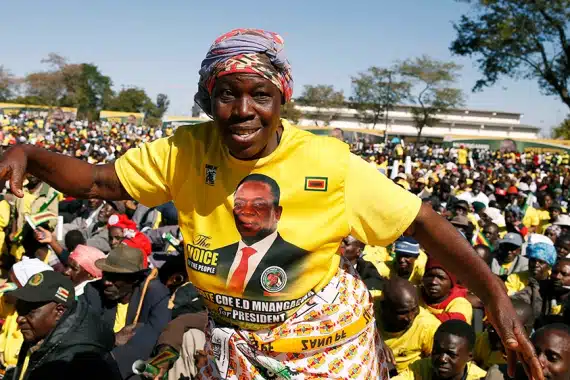Fresh from being exposed as a part of a criminal gang dealing in dirty money laundering and smuggling of gold from Zimbabwe in a four-part series by Al Jazeera undercover investigative journalists, the beleaguered Zimbabwean president Emmerson Mnangagwa is set to face the youthful and vibrant presidential candidate in the forthcoming presidential election.
The Zimbabwean head of government, Mnangagwa, is heavily soiled in the Al Jazeera in the four-part documentary as one gold smuggler is describing the president as his business partner while another talked of the country’s leader as a former partner whom he still meets and a third said he had to keep the president in the loop about gold smuggling operations.
Further, the president’s niece outlined an elaborate money laundering and gold smuggling scheme that she promised to help execute – and one of Zimbabwe’s top diplomats, self-anointed prophet Uebert Angel who was handpicked for his position as ambassador-at-large by Mnangagwa – dialled the president’s wife to try to seal a laundering deal.
An independent committee in the southern African nation and a former British colony, Zimbabwe, formerly Southern Rhodesia, has announced that 45-year-old lawyer and pastor, Nelson Chamisa, has been re-elected as the opposition party’s presidential candidate to face the politically ruthless Mnangagwa, who is popularly known as a ‘the crocodile’ in the next upcoming polls.
However, the odds are stacked against the opposition, the Citizens Coalition for Change.

The opposition coalition parties have accused president Mnangagwa, a man who toppled Zimbabwean tinpot dictator Robert Mugabe through coup d’état, of a crackdown on political opponents.
A vibrant and charming new-age politician, Chamisa will be Zimbabwean President Emmerson Mnangagwa’s official opponent for a second time in an upcoming crunch vote after the opposition party have endorsed him.
However, no date has yet been set for the presidential and legislative votes, though they are expected to be held in August this year.
An independent committee announced Chamisa was re-elected as the opposition party’s presidential candidate in an uncontested vote.
“Chamisa has been nominated as the presidential candidate by all streets and villages”, the committee’s spokesman Shepherd Ngandu told a press conference in Harare.
The President of Zimbabwe is elected using the two-round system.
The 270 members of the National Assembly consist of 210 members elected in single-member constituencies and 60 women elected by proportional representation in ten six-seat constituencies based on the country’s provinces.
Voters cast a single vote, which is counted for both forms of election.
The 80 members of the Senate include 60 members elected from ten six-member constituencies, also based on the provinces, by proportional representation using party lists; the lists must have a woman at the top and alternate between men and women.
The other 20 seats include two reserved for people with disabilities and 18 for traditional chiefs.

Most Zimbabweans both at home and abroad are dismayed by the reports that the Zimbabwean their head of state and government, Mnangagwa, is embroidered in the gold mafia syndicate and believe that his position is unattainable from the scandal.
Nottingham is home to many Zimbabwe and who fled the country and relocated to the United Kingdom because Mugabe’s dictatorship and hoped that the former British colony would be a better place after Mugabe but things, it appears, haven’t changed.
Rumbidzai Jongwe, 33, a mother two daughters, of Beeston in Nottingham said: “Zimbabwe is getting worse by the day. When I fled Zimbabwe, I hoped things would be much better when Mugabe is gone but it looks like we are stuck forever with these crooks.
“I have watched the Gold Mafia four-part documentary and it is disgusting. With all that information that link president Mnangagwa to gold smuggling, and we are still acting like nothing is wrong. Mnangagwa is still in charge and gold will still be smuggled. I am actually angry,” she added.
54-year-old Michael Fadzai of St. Anns said: “The only way to take out Mnangagwa is to vote him out during the elections. It is time we try the new blood.”

General elections were held in Zimbabwe on 30 July 2018 to elect the President and members of both houses of Parliament.
Held eight months after the 2017 coup d’état, the election was the first since independence in which former President Robert Mugabe was not a candidate.
ZANU–PF, the country’s ruling party, went into the election with majorities in both the National Assembly and the senate.
The main opposition, the Movement for Democratic Change – Tsvangirai, contested the election as part of the MDC Alliance, a coalition that included the MDC–T and six smaller parties.
The election gave ZANU–PF control of both houses in the 9th parliament of Zimbabwe, though with reduced majorities in each.
The MDC Alliance gained seats in both houses, closely corresponding to ZANU–PF’s losses.
In the presidential election, Emmerson Mnangagwa, who became president as a result of the 2017 coup ran for election as the ZANU–PF candidate.
Morgan Tsvangirai, the MDC–T leader who was expected to run against him, died in February 2018 and Nelson Chamisa, the new party leader, replaced him as the MDC Alliance candidate.
The Zimbabwe Electoral Commission announced Mnangagwa as the winner with 50.8% of the vote and gave Chamisa’s 44.3%, giving Mnangagwa the majority needed to avoid a runoff.
The announced results were disputed by MDC alliance and critiqued internationally.
Mnangagwa won six of the country’s ten provinces, while Chamisa won four, including the two metropolitan provinces, Harare, and Bulawayo. It was the closest since 2008 that an opposition party had come to breaking ZANU–PF’s 38-year hold on power.




